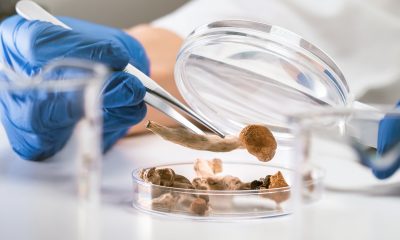CEO of Cybin Inc. Doug Drysdale tells Psychedelic Health about the company’s latest findings on its novel molecules – CYB003 and CYB004.
Cybin has recently announced progress updates for its two lead clinical development programmes.
CYB003 is the company’s proprietary deuterated psilocybin analogue for the potential treatment of Major Depressive Disorder (MDD) and CYB004 is its proprietary deuterated DMT molecule that is being developed for the potential treatment of Generalized Anxiety Disorder (GAD).
Cybin is aiming to revolutionise mental healthcare with these innovative formulations of psychedelic compounds – we speak to Cybin CEO, Doug Drysdale, about the company’s latest data announcement.
CYB003 – novel psilocybin
Interim findings from Cybin’s ongoing Phase 1/2a clinical trial evaluating CYB003 has demonstrated positive observations and the company suggests it may ultimately reduce symptoms of depression after just one or two doses.
Cybin CEO, Doug Drysdale, highlights unique characteristics of the analogue that have been demonstrated in the observations such as a rapid and short-acting psychedelic response in participants, low variability in plasma levels and its ability to induce a psychedelic effect at low doses, while maintaining a safe and well-tolerated therapeutic profile.
For the study, participants received single oral doses of CYB003 at 1 mg, 3mg, 8mg and 10mg, and all doses were well-tolerated with no serious adverse events reported.
The data also demonstrated that participants reported meaningful and robust psychedelic effects at the 8mg and 10mg doses, confirming that a complete mystical experience was achieved.
“It’s unusual to have a treatment where you can quickly see the effects and when you look across the literature, when you read about people having these very robust psychedelic experiences, or when people will tell you that these experiences fall among the top five most meaningful experiences of their lives, then I think that gets us really excited about what that means in terms of this efficacy study,” said Drysdale.
“Clearly they have very profound experiences. So, we’re definitely in a phase where we think we’re at the therapeutic dose.”
CYB003 could offer a solution to some of the perceived challenges in implementing psychedelic-assisted psychotherapies in our current healthcare systems.
Traditional psilocybin can last from three to six hours, meaning delivering this therapy in clinical settings will take up a lot of resources, such as staff and therapy rooms. These longer experiences can also make it difficult for some to participate in the therapy due to work and life commitments.
With CYB003 being a fast-acting, short-duration psychedelic compared to a traditional psilocybin experience, the molecule could make the therapy much more cost-effective and accessible for healthcare systems and patients.
Its novel delivery form may also offer benefits said Drysdale: “It’s an oral – we’re developing a capsule so there’s no need for an IV infusion pump. That makes it really simple to dose.
“Patients appear to have an onset of effects quite quickly, in 15 minutes or so. Depending on the patient, there are quite robust effects within the range of 30 to 90 minutes or maybe at a couple of hours in that peak state. So, that’s relatively short.”
Drysdale highlights that for some patients with depression, a fast-acting medicine that can see results this quickly is beneficial, as traditional treatments such as SSRIs can take months to work.
Phase 1 dosing has been completed and the Phase 2a portion of the trial has commenced. Cybin expects to report top-line results from the completed Phase 1/2a clinical trial in late third quarter of calendar year 2023.
CYB004 – novel DMT
Cybin’s DMT analogue – CYB004 – is a scalable and less invasive treatment than traditional DMT. Its Phase 1 CYB004-E trial is evaluating CYB004 in healthy volunteers.
The company confirmed in its update that, per a protocol amendment to the initial trial design, it has established a three-part study to include Part A (IV DMT infusion), Part B (IV DMT bolus + infusion) and Part C (CYB004) in healthy volunteers.
This will allow the company to initiate first-in-human dosing of CYB004 sooner than initially planned. Data from the new Parts B and C of the trial will serve to build a more robust pharmacokinetic and pharmacodynamic model to optimise dose selection and formulation development for future clinical studies.
Part A of the trial evaluating DMT IV in participants is already complete, and IV DMT at the evaluated dose ranges was demonstrated to be safe and well-tolerated. Dosing has now commenced in Part B.
DMT in its native form is not orally bioavailable which means it cannot be delivered in capsule form as CYB003 is.
“What we have done with deuteration is enabled the molecule to be more bioavailable and we have improved the brain penetration,” Drysdale commented. “So, we should be able to formulate that into a small volume that can be given in a more convenient way. This could be intramuscular or subcutaneous injection.”
“Whereas at the moment we’re studying DMT, and others are as well, using an IV infusion”
IV infusion is not ideal as it requires a line and an infusion pump that needs to be programmed to provide a certain amount of drug over a certain rate of time – needing equipment, a clinical setup and trained personnel – which Drysdale highlights as a major barrier to adoption.
Cybin’s current study with CYB004 is aiming the understand the right dosing and plasma concentrations, and the relationship between the two and psychedelic effects. A model will be built over the course of the study that will then be translated into a convenient dose form.
Drysdale said: “One thing we know about DMT is that once the psychedelic effects wear off, it’s cleared from the body fairly quickly. So within 10 minutes or so it’s not traceable. So this could really be a very convenient form for patients and that finally brings them these treatments to the real world.”
Dosing of CYB004 in Part C is expected to begin in early Q2 2023, following the completion of Part B, and Cybin expects to report top-line results from the completed Phase 1 CYB004-E clinical trial in the third quarter of 2023.
“It is really gratifying to be at this point where, for much of the team who have been working in a lab or working on the more sort of theoretical side of things, to see an idea from a few years ago now being tested in patients,” said Drysdale.
“Around 2000 people die every day from suicide, so this can’t come fast enough. To see the potential for profound effects really quickly is very exciting.”
Join Cybin at PSYCH Symposium
Cybin is a sponsor for PSYCH Symposium: London 2023 which will take place on 6 July at London’s iconic British Museum.
The event will provide audiences with the opportunity to hear exclusive presentations and discussions on stage and to network with leading industry figures.
Cybin’s Chief Medical Officer, Amir Inamdar, will be speaking at the event.
Inamdar is a qualified psychiatrist and pharmaceutical physician with over 20 years of clinical and drug development experience. Previously, he has led clinical drug discovery teams as a medical director for AstraZeneca, Takeda and GlaxoSmithKline.
Get your tickets to PSYCH Symposium: www.psychsymposium.com/tickets

 Opinion2 years ago
Opinion2 years ago
 Insight3 years ago
Insight3 years ago
 Medicinal2 years ago
Medicinal2 years ago
 Research2 years ago
Research2 years ago
 Medicinal2 years ago
Medicinal2 years ago
 Markets & Industry1 year ago
Markets & Industry1 year ago
 News3 years ago
News3 years ago
 Medicinal2 years ago
Medicinal2 years ago

















